Hiking is a great way to get exercise and immerse yourself in nature, but it can come with some soreness afterward. Sore feet are common after a long hike, as your feet endure a lot of impact and strain while navigating through different terrains. In this guide, we will discuss some tips on how to treat sore feet after hiking.
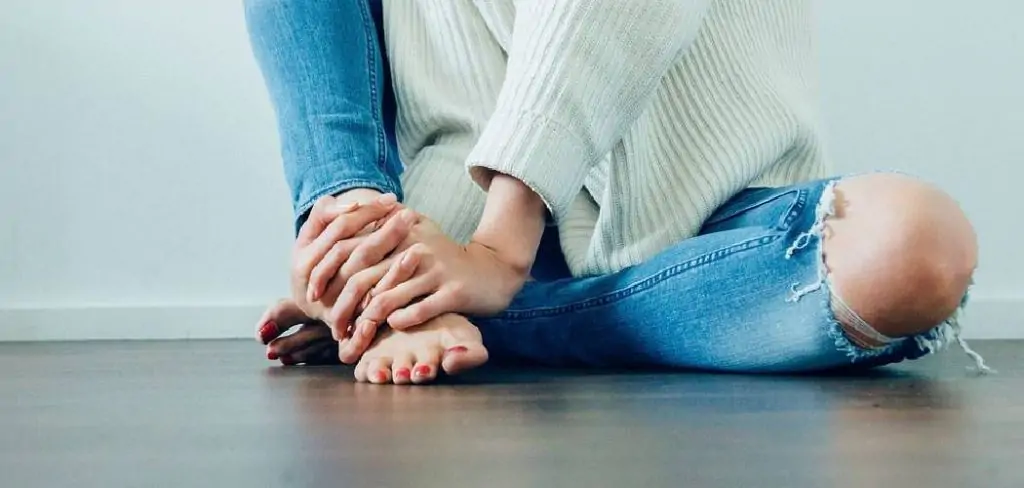
What Are Some Common Causes of Sore Feet After Hiking?
There are a few common causes of sore feet after hiking:
- Wearing Ill-fitting Footwear: This is one of the main causes of foot pain while hiking. If your shoes or boots are too tight or too loose, it can cause blisters, calluses, and discomfort.
- Not Breaking in New Shoes: If you have recently purchased new hiking shoes or boots, it’s important to break them in before a long hike. Otherwise, you may experience discomfort and pain.
- Walking on uneven terrain: Hiking trails often have uneven surfaces, which can put a strain on your feet as they constantly adjust and stabilize.
- Carrying Heavy Backpacks: Carrying a heavy backpack can add extra pressure to your feet, causing them to tire and become sore.
- Not Properly Stretching Before Hiking: Just like any physical activity, it’s important to stretch your muscles before hiking. Neglecting to do so can lead to tightness and pain in your feet.
Discover Expert Tips on How to Treat Sore Feet After Hiking
Tip 1: Wear Proper Footwear
One of the most crucial steps in preventing and treating sore feet is ensuring you’re equipped with the right footwear. Quality hiking boots or shoes can provide the necessary support for your feet. These should be well-fitting, offering ample space for your toes, yet snug enough to prevent your foot from sliding around. Additionally, they should have good arch support and firm ankle support. Avoid wearing old or worn-out shoes, as they might not provide the needed protection and support, contributing to foot pain.
Tip 2: Stretch Before and After Hiking
Proper stretching before and after your hike can significantly alleviate and prevent soreness in your feet. Focus on stretching your calves, hamstrings, and ankles to improve flexibility and reduce tension in your feet. This will also help prevent injuries while hiking. Perform slow, controlled stretches, holding each for about 30 seconds to allow your muscles to properly elongate. Remember to stretch both sides equally to maintain a balanced body. Regular stretching can also increase your range of motion, contributing to a more efficient and enjoyable hiking experience.
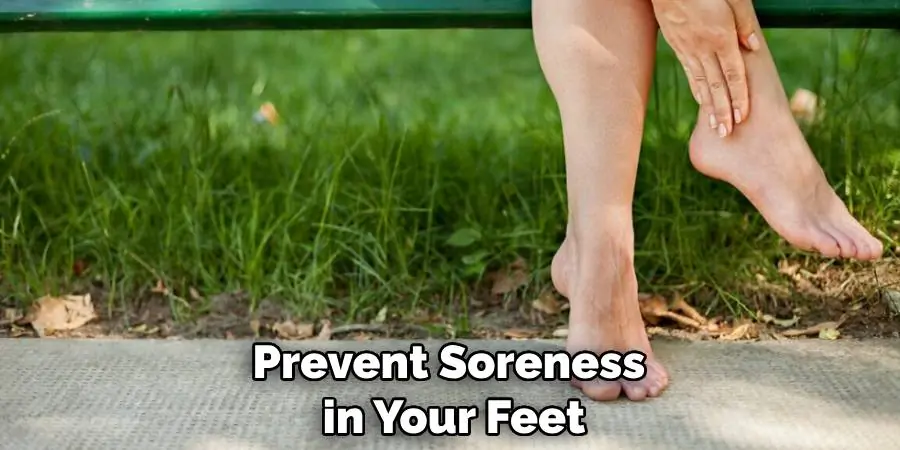
Tip 3: Take Breaks During Your Hike
It’s essential to take breaks during your hike, especially on longer and more challenging trails. Giving your feet a break from the constant impact and pressure can help prevent soreness and fatigue. Aim for taking short breaks every hour or so to rest, stretch, and allow your feet to recover before continuing.
Tip 4: Use Proper Technique
Proper technique while hiking can also help prevent sore feet. Make sure you are walking with proper posture, using the right muscles, and taking short strides rather than long ones. This will help distribute weight evenly and reduce strain on your feet.
Tip 5: Soak Your Feet in Epsom Salt
Soaking your feet in Epsom salt can provide immediate relief for the soreness experienced after a long hike. The magic ingredient in this remedy is magnesium, which is absorbed through the skin when bathing in Epsom salt. Magnesium works wonders by relaxing our muscles, relieving tension, and reducing inflammation in the feet. To do this, fill a basin with warm water and add about half a cup of Epsom salt, stirring until it’s mostly dissolved. Soak your feet for 15-20 minutes, and let the healing powers of Epsom salt work its magic.
Tip 6: Massage Your Feet
Massaging your feet can soothe sore muscles and stimulate blood circulation. You can use tools like a massage ball or roller, or simply use your hands to massage specific areas of your feet that feel tight or painful. To do this, sit comfortably, place your foot on a massage ball or roller, and roll it back and forth from your heel to your toes. Apply as much pressure as you find comfortable. Remember to massage your arches and the balls of your feet as well. If you’re using your hands, press your thumbs into these areas and knead gently. Spend a few minutes on each foot, and try to do this regularly for best results.
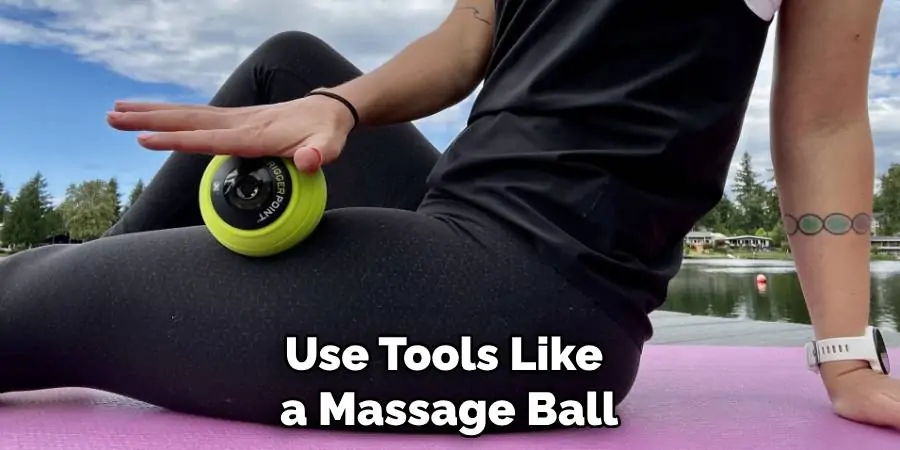
Tip 7: Elevate Your Feet
Elevating your feet can be a simple yet effective method to alleviate soreness after a hike. By raising your feet above heart level for about 10-15 minutes, you encourage the flow of blood and lymph fluids back toward your heart. This helps reduce swelling and discomfort in the feet. You can use a pillow or a rolled-up towel to prop up your feet. Ensure that they are comfortably supported and that the elevation is sufficient to notice a difference. Practicing this habit after your hiking adventures can contribute greatly to quicker recovery and less discomfort.
Tip 8: Stay Hydrated
Proper hydration is fundamental, not just for overall health, but it also plays a vital role in preventing and alleviating foot pain from hiking. When you’re dehydrated, your body’s muscles, including those in your feet, can cramp up or become fatigued more easily, leading to soreness and pain. Furthermore, dehydration can increase your body’s inflammatory responses, which can lead to more discomfort in overworked feet. So, make sure that you are drinking plenty of fluids before, during, and after your hike. Carrying a refillable water bottle or hydration pack can make it easier for you to stay hydrated on the trail. Remember, if you’re feeling thirsty, you’re already mildly dehydrated. So, keep sipping water throughout your hiking adventure to keep your body well-hydrated and your feet ready for the journey.
Tip 9: Take Pain Relievers
If your foot soreness is particularly intense, over-the-counter pain relievers such as ibuprofen or acetaminophen can provide temporary relief. These medications work by reducing inflammation, and helping to alleviate discomfort in your feet. However, remember that this should not be your first or only solution. Over-reliance on pain relievers can mask an underlying issue that may need attention. If your feet continue to hurt after several days, or the pain increases, it’s advisable to consult a healthcare professional. As always, follow the manufacturer’s instructions when taking any medication, and don’t exceed the recommended dosage.
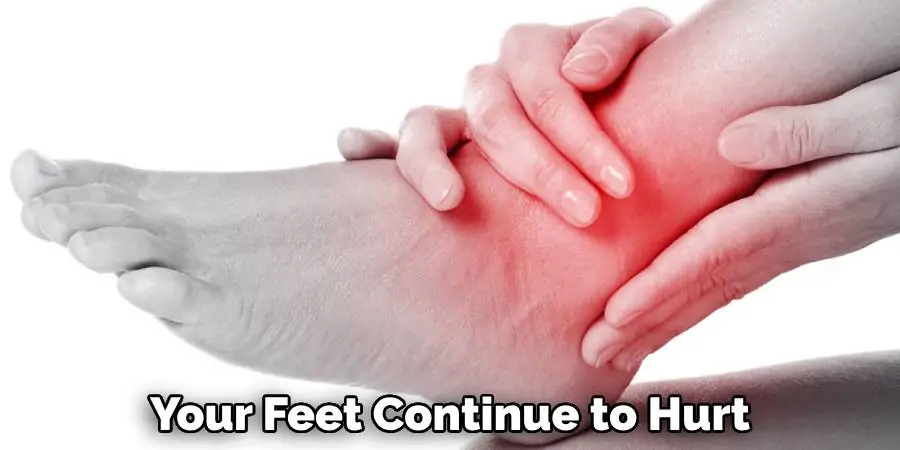
Tip 10: Consult a Doctor
If you experience severe or persistent foot pain after hiking, it’s crucial to consult a doctor. They are best equipped to determine the underlying cause of your pain and provide the appropriate treatment to help you recover. This could include physical therapy, medication, or in some cases, surgery. Additionally, your doctor can offer valuable advice on how to avoid future injuries and make your hiking experiences more enjoyable and less painful. Always remember, that persistent or severe pain is not normal and should not be ignored. Make your health and safety a priority, and seek professional medical advice when necessary.
How to Prevent Sore Feet Before Hiking
While it’s essential to know how to alleviate sore feet after a hike, preventing the pain from occurring in the first place is even better. Here are some tips to help you prevent sore feet before your next hiking adventure:
- Wear proper hiking shoes or boots that fit well and provide adequate support for your feet.
- Break in new shoes before your hike to avoid blisters and discomfort.
- Invest in moisture-wicking socks to keep your feet dry and prevent blisters.
- Use hiking poles to help distribute weight and reduce strain on your feet.
- Train and condition your feet before tackling longer or more challenging hikes.
- Listen to your body and take breaks when necessary to rest and allow your feet to recover.
By following these tips, you can help prevent sore feet and enjoy your hiking adventures to the fullest. Remember, taking care of your feet is essential for a successful and pain-free hike. So, take the time to prepare, listen to your body, and seek professional advice when needed. Happy trails!
Frequently Asked Questions (FAQs)
How Do I Stop My Feet From Hurting After Hiking?
By following the tips mentioned above, such as stretching, massaging, elevating your feet, staying hydrated, and taking pain relievers if necessary. Additionally, wearing proper hiking shoes and training your feet can also help prevent soreness after a hike.
How Do I Stop My Feet From Hurting After Walking?
Many of the tips mentioned in this guide can also apply to preventing sore feet after walking, such as stretching, massaging, and staying hydrated. Additionally, make sure you are wearing comfortable shoes that fit well and provide adequate support for your feet.
How Do You Take Care of Your Feet After a Long Walk?
To take care of your feet after a long walk, follow the tips mentioned in this guide, such as stretching, massaging, elevating your feet, and staying hydrated. Additionally, make sure to clean and dry your feet thoroughly and wear comfortable shoes that fit well. If you experience persistent pain or discomfort, consult a doctor for further advice.
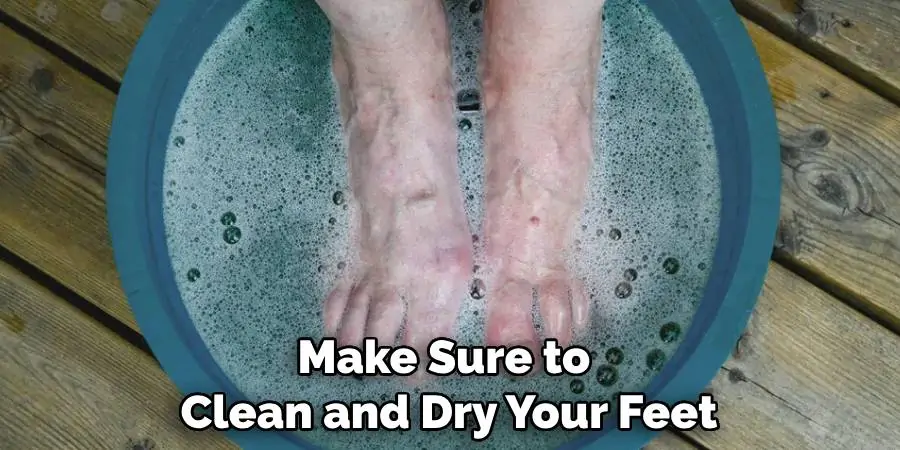
Conclusion
In conclusion, taking care of your feet is crucial after a long and strenuous hike. From proper footwear to foot care routines, there are numerous ways to alleviate soreness and prevent injuries. By implementing the expert tips shared in this blog post, you can ensure that your feet remain healthy and pain-free on your next hiking adventure. Remember to invest in high-quality hiking shoes, stretch before and after your hike, and give your feet some well-deserved TLC with massages, ice baths, and rest.
So don’t let sore feet stop you from exploring the great outdoors. Take action now and incorporate these tips into your post-hike routine for happy, healthy feet! Share these tips with your fellow hikers and spread the word on how to treat sore feet after hiking. With proper care, you can continue to enjoy nature’s wonder without any discomfort or pain in your feet. Happy hiking!
